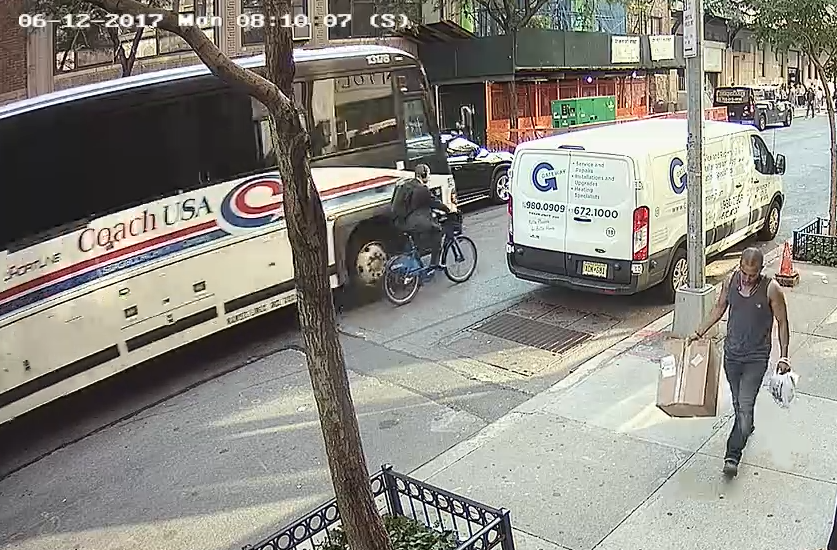Lawyers for a bus driver who killed a Citi Bike rider in 2017 — and was found guilty of a criminal charge of failing to yield — are taking their fight against the basic road safety violation to the state's highest court in hopes of having city's Right of Way Law ruled unconstitutional.
If successful, the shocking effort by lawyers for Dave Lewis could lead to the defanging city administrative code section 19-190, which was created in 2014 to make "failure to yield" a criminal misdemeanor, punishable by a maximum of 30 days in jail. The law has become a valuable law enforcement tool for reining in drivers who kill and maim New Yorkers — and, indeed, Lewis was found guilty and sentenced to 30 days in jail, a sentence he has yet to serve as his case wends through the appeals process.
It's the first time a challenge to the city's "Right of Way" law has made it to the state's Court of Appeals, the highest court in the land of Excelsior. Lewis's first appeal, to the Appellate Division, First Department, was rejected in October, 2019, in a unanimous ruling; such a ruling typically discourages the Court of Appeals from even sniffing at a further appeal, but Lewis's lawyer successfully got the case on the high court docket earlier this year — though the case was suspended during the COVID-19 pandemic.
That led to a flurry of briefs being submitted to the court this summer by Lewis's lawyer, Nathaniel Marmur, and by Manhattan District Attorney Cyrus Vance Jr., who continues to push the courts at all levels to maintain a criminal liability for drivers who fail to yield the right of way.
The case — both at trial and on the first appeal that Lewis lost — hinges on a simple, but vital legal concept known as mens rea, a Latin term that speaks to a suspect's state of mind at the moment of the crime.
In a criminal case, Lewis's lawyers argue, the burden of proof is on prosecutors to show that the alleged perpetrator knew that his actions would violate the law — and acted in full knowledge of same. In essence, Lewis's lawyer is arguing that it can only be a "crime" if the suspect is operating under one of four "culpable mental states" that are strictly defined in the state's penal law: acting “intentionally,” “knowingly,” recklessly,” and/or with “criminal negligence.”

"For centuries, the common-law courts have distinguished between ordinary negligence which should not form the basis of a criminal charge, and negligence so egregious as to be deserving of criminal punishment," Marmur's brief states. "The key area of disagreement is whether a statute outside the penal law must employ at least one of those mental states. It must."
It must not, Vance has argued.
"Defendant contends that 'ordinary accidents do not amount to criminal negligence,' and that the defendant’s actions did not amount the level of 'moral blameworthiness that is the touchstone of criminal negligence,'" Vance's brief states. "In defendant’s view, criminal liability in New York cannot be premised on a mental state of civil negligence. ... Defendant’s argument is at odds with settled law."
To Vance, and most observers beyond Lewis's legal team, the state's penal law does define "culpable mental states," but it also says that people can be held criminally liable of a given offense, such as failure to yield, if the crime itself "includes a voluntary act or the omission to perform an act which he is physically capable of performing."
In Lewis's case, he omitted the performance of an act — the act of yielding to bicyclist Dan Hanegby, who was in front of the bus driver on W. 26th Street in the seconds before the fatal June 12, 2017 crash. In fact, Lewis honked his horn at Hanegby, which provided further evidence at trial that the driver knew what he was doing — and opted not to drive safely. The side of his bus hit Hanegby's handlebars as he passed, knocking the cyclist to the ground, where he was then crushed under the bus's tires.
Vance's latest brief basically mocks Lewis's argument. "Defendant seems to take umbrage with the fact that a civil standard looks at the conduct in light of what a 'reasonable person' would do, which as defendant sees it, is at odds with the premise that in order for a person to be found criminally liable, his conduct must be morally blameworthy."
It's unclear why the Court of Appeals took the case — it doesn't issue press releases. But it may simply be that the high court wants to weigh in — once and for all — on the matter of the constitutionality of the Right of Way Law. Last year, the Appellate Division, First Department, issued what its unanimous panel hoped would be the last word on the legality of finding reckless drivers criminally liable. In that ruling, the judges became the first state panel to definitively declare 19-190 constitutional, setting aside some prior lower court rulings in which judges had occasionally sided with Lewis's argument, namely that reckless intention or motivation needed to be proven before a driver could be convicted of the criminal violation, rather than merely a civil one.

To be clear, Lewis's trial judge, Judge Heidi Cesare, did not buy that argument, finding him guilty of simply failing to yield to Hanegby, who was pedaling in front of the speeding Coach bus driver. Cesare did not rule on the constitutionality of the matter when she handed down the maximum sentence of 30 days — but then again, Lewis did not make that argument at the time, waiting until his appeal. But the Appellate Term unanimously rejected the argument, setting up the Court of Appeals trial, which is expected to be heard early next year.
"In New York City, drivers and bicyclists regularly wend their way through narrow streets," Lewis's high court brief states. "Unfortunately, accidents sometimes occur, and the results, as here, can be tragic. But accidents by themselves do not imply criminal negligence. And no reasonable trier of fact could conclude that, on the morning of June 12, 2017, Dave Lewis’s conduct was so 'morally blameworthy' and reprehensible that society would label him a criminal."
Plenty of reasonable triers of fact would indeed conclude just that.
"There are numerous provisions of law that create criminal penalties for conduct accompanied by a merely negligent mens rea," said Steve Vaccaro, a personal injury lawyer who works with cycling clients. "The legislature can establish a statute that provides definitions for four culpable mental states, but the statute does not state that a defendant must have one of those states to be held criminal liable. Lewis is asking the court to declare that you must have one of the four specified mental states to be found guilty of a criminal offense, but there's no rationale for arguing that. It's unwarranted and it's been rejected before."
In 2019, cops issued more than 2,700 Right of Way law tickets, though roughly half are dismissed by the city's administrative court, City Limits reported. And only a tiny portion — just a few dozen — are prosecuted as criminal cases every year.
Nonetheless, advocates think that tossing out the criminal part of the Right of Way law would send the wrong message.
"The law hasn't lived up to its promise of reining in reckless drivers because the NYPD and the DA have used it too sparingly," said Marco Conner DiAquoi of Transportation Alternatives. "That's typical for new laws, but if the Court of Appeals affirms the law, that could help it be used more broadly, as it was intended."
Conner DiAquoi said the criminal statute is a bridge between the current civil summonses issued for egregious reckless driving — "They're just slaps on the wrist," he said — and much more serious charges such as manslaughter, which are very hard for a DA to prosecute because in such cases, the burden of proof is on prosecutors to fully prove the driver's mens res was indeed to intentionally cause death.
"Maintaining the criminal punishment in the right-of-way law is crucial," Conner DiAquoi said. "You could argue that the maximum sentence of 30 days is insufficient, but it's still a criminal punishment that sends a message that the kind of reckless driving that cost Dan Hanegby his life will not be tolerated. That's the promise of the right-of-way law."
Marmur did not return a call seeking comment.






